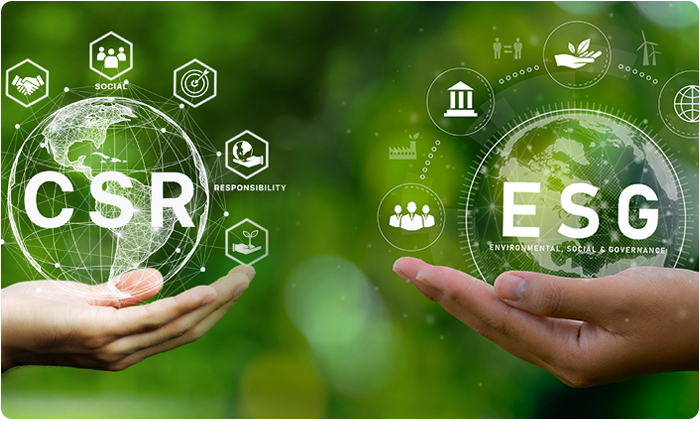ESG and CSR: What’s the Difference?

ESG, standing for Environmental, Social, and Governance, pertains to how companies handle these aspects in their operations, crucial for investors. On the other hand, CSR, or Corporate Social Responsibility, is a self-regulatory approach focused on a company’s societal impact, including philanthropy and ethical standards.
This article explores the differences between ESG and CSR, emphasizing their unique roles in promoting sustainable business practices. Additionally, it highlights the value of platforms like AWorld in assisting companies in navigating these intricate areas, where business success and social responsibility coexist.
The acronyms ESG and CSR are often used interchangeably within many companies today. But do they really mean the same thing? Well, the answer is no.
Read on to discover their meanings and how they differ!
What does ESG mean?

ESG stands for Environmental, Social and Governance. As the name suggests, it refers to the environmental, social and governance practices of a company. It’s a criterion that investors use to evaluate companies based on how they address and incorporate these aspects into their operations.
An example? Environmental practices might include energy use and waste management, among many other factors; social practices look at the company’s relationships with employees, suppliers and communities; and governance encompasses aspects like leadership, audits, internal controls and shareholder rights.
What does CSR mean?

CSR stands for Corporate Social Responsibility. It consists of a model of corporate self-regulation that helps a company to be socially accountable to itself, its stakeholders and the public.
By embracing CSR, a company becomes more aware of its impact on all societal aspects, including economic, social and environmental ones. Typical CSR initiatives include philanthropic efforts such as charitable donations, volunteering and the implementation of environmentally friendly practices.
Main differences between ESG and CSR
Although both ESG and CSR share the same underlying objective of promoting sustainable business practices, they differ in scope and approach.
ESG is primarily investors-focused, offering a set of standards for a company’s operations that are used to evaluate potential investments. It is data-driven, measurable and often integrated into a company’s financial decision-making process.
On the other hand, CSR concerns the overall social consciousness of a company and is often seen as a self-regulatory mechanism through which a company ensures its compliance with national or international ethical standards and regulations. While ESG deals with a company’s impact on external stakeholders and its operating methods, CSR focuses more on how companies give back to society.
AWorld: your ally in ESG and CSR

Managing ESG and CSR aspects can be challenging. This is why platforms, such as AWorld, have been developed precisely to help companies optimize their efforts in these areas.
AWorld offers companies numerous functionalities to track, manage and report on their CSR and ESG activities, while actively engaging their employees. This helps companies align their strategies with global standards, enhancing transparency and accountability.
Global Impact
ESG and CSR, though distinct, share a common thread of global significance. In an increasingly interconnected world, companies operate on an international stage, necessitating alignment with global standards and regulations.
ESG criteria transcend borders, requiring companies to consider environmental, social, and governance practices that resonate with international stakeholders. CSR, too, extends its influence beyond local boundaries, emphasizing a company’s role in addressing global challenges.
Industry-Specific Considerations
Recognizing the diversity of industries, it becomes evident that ESG and CSR efforts are not one-size-fits-all. Each sector grapples with unique sustainability challenges and opportunities.
For example, the energy industry faces scrutiny over carbon emissions and resource management, while the tech sector focuses on data privacy and ethical technology development. Tailoring ESG and CSR strategies to industry-specific demands is essential to effectively address sector-specific concerns.
Measuring and Reporting

Measuring and reporting ESG and CSR initiatives is more than a corporate formality; it’s a testament to a company’s commitment to sustainability and social responsibility. Quantifiable data offers transparency, enabling stakeholders to evaluate a company’s progress.
ESG metrics provide investors with valuable insights into a company’s risk management and ethical practices. CSR reporting showcases a company’s dedication to societal betterment. Collecting data, setting benchmarks, and disclosing progress are integral steps toward fostering trust and accountability.
Conclusion
In short, ESG and CSR should not be used interchangeably. They are distinct concepts, each playing a vital role in today’s market. For companies aspiring to excel in these areas, AWorld offers an ideal platform to support these endeavors, paving the way towards a future where business success and social responsibility go hand in hand. Want to know more? Let’s connect.



